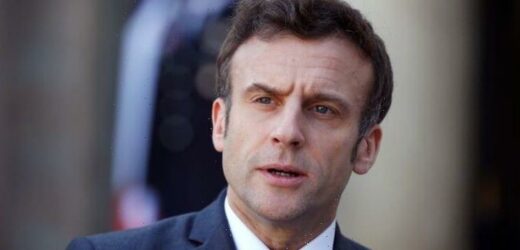Macron’s French EU presidency speech analysed by expert
We use your sign-up to provide content in ways you’ve consented to and to improve our understanding of you. This may include adverts from us and 3rd parties based on our understanding. You can unsubscribe at any time. More info
In the run-up to the French elections in April, Mr Macron has been sure to reinstate his commitment to his country’s “energy destiny”. At a press conference earlier this month, the current French President detailed his plans for the ecological transition, building on earlier comments made in February. Mr Macron said: “The production strategy that I wish to implement for the nation is essentially based on three main points.
“To continue investments aimed at reducing consumption, to deploy massively renewable energies, based on solar energy, offshore wind power and onshore wind power.
“And to produce nuclear power with the immediate implementation of a new reactor construction plan.”
MP Jean-Charles Colas-Roy said Mr Macron will unleash a €50billion (£41.7billion) “green” package, devoting €10billion (£8.3billion) per year to the transition.
Ramping up France’s nuclear capacity is said to be a key part of the plan.
In February, Mr Macron said he is planning to build six new nuclear reactors “by 2028, with the first reactor to be commissioned by 2035”.


The French President also mulled over the possibility of building eight more.
He added: “I hope that no nuclear reactor in a state of production will be closed in the future, given the very significant increase in our electricity needs. Unless, of course, there are safety reasons for doing so.”
But the drive to expand France’s nuclear capacity has not been welcomed by everyone.
Climate activist Robin Ehl tweeted: “Instead of switching to renewable energy, Macron wants to relaunch the country’s nuclear industry.
“While nuclear power plants are attacked by the Russian army, Macron promises to build at least six new nuclear power plants if he is re-elected.”

France already generates 70 percent of its electricity from nuclear energy.
This makes it the third most successful country in the world in this domain, producing 338,671 gigawatts of nuclear electricity in 2020.
Whether or not nuclear power is a “green” energy source has been a contentious issue, though.
Germany for example is in the process of phasing out all its remaining nuclear power stations, with the last three due to shut down by the end of the year.
One of the significant environmental concerns related to nuclear power is the creation of radioactive wastes like uranium mill tailings and spent reactor fuel.
DON’T MISS
Putin sparks EU chaos as he finds ‘way to avoid sanctions’ [REVEAL]
UK ready to open North Sea taps and decimate ‘Putin’s war’ [INSIGHT]
Rolls-Royce steps up to save Britain and cripple Putin’s energy grip [REPORT]

Despite this, France has been pushing for the EU to label nuclear energy as a transition fuel which should be included in the bloc’s “green taxonomy”.
This is the EU’s list of sustainable investments.
But critics have gone as far as to call Mr Macron out for “climate sabotage”.
Pauline Boyer, a campaigner for energy transition at Greenpeace France, said: “President Macron stubbornly promotes the illusion of nuclear power as a climate solution, despite admitting that no new nuclear power plant will produce electricity before 2040.

“Polluting, failing, expensive and slow, nuclear energy is neither ‘green’ nor ‘transitional’ and should not be included in the taxonomy.”
But Mr Macron still upholds that sticking with nuclear power will help France meet its commitment to be carbon-neutral by 2050 and can slash reliance on fossil fuels.
Alexandre Danthine, from Aurora Energy Research, said: “If we look at it from the carbon perspective, nuclear is one of the best in class.”
Source: Read Full Article


